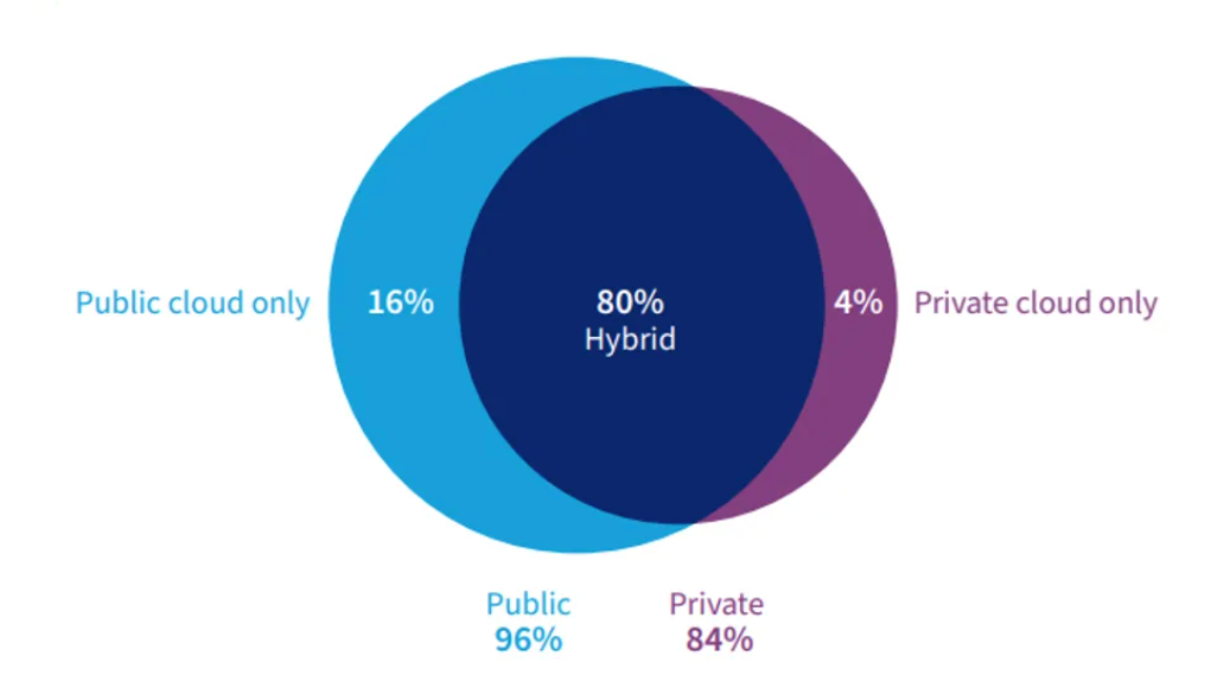In today's fast-paced business world, cloud computing has become a necessity for companies looking to stay ahead of the competition and protect critical data. As a decision-maker, you know that making the right decisions for your business can mean the difference between success and failure.
But because there are so many cloud deployment models, it can take time for executives to choose the right one. Especially when deciding between multi-cloud and hybrid-cloud environments.
Which cloud solution is right for your business? Let's explore the options.
This article is based on the Cloud Migration white paper, which explains key migration trends for 2023. You can get your copy here if you'd like to get the full picture of cloud service adoption.
Table of contents:
- The big switch: private and public clouds (combined)
- Hybrid cloud solutions
- Multi-cloud solutions
- Hybrid cloud vs. multi-cloud environment
- Conclusion
The big switch: private and public clouds (combined)
Before we dig into the differences between hybrid clouds and multi-cloud services, let's take a moment to review the four main types of cloud deployment – which are the most common cloud migration options as of early 2023.
- PUBLIC CLOUD – resources are managed in a pay-as-you-go pricing model. Public cloud services can be used concurrently by multiple users. Currently, the most popular public cloud provider is AWS, tightly followed by Microsoft Azure and Google Cloud Platform.
- PRIVATE CLOUD – resources are dedicated to a single organization and provide benefits such as increased security, improved performance, regulatory compliance, and cost savings. A company can build and maintain its private cloud or pay an external vendor to do so.
- HYBRID CLOUD – resources are deployed across multiple clouds based on the workload's needs and are typically focused on one task. Hybrid cloud systems usually combine public and private clouds or public cloud and on-premises infrastructure (internal data center, corporate network).
- MULTI-CLOUD – resources are distributed across multiple public clouds (as any other combination makes it hybrid). A company subscribes to different cloud providers simultaneously, using one public cloud as a database, another as PaaS, another for user authentication, and so on.
Although many public cloud providers offer pay-as-you-go pricing, businesses tend to over-purchase services. This increased awareness of cloud spending has prompted companies to evaluate their needs and expenses and, if they do not add up, to consider partly reverting to on-premises computing.
As a result, we are now witnessing a massive leap toward a hybrid cloud, which is already adopted by 82% of IT leaders. Microsoft expanded the trend even more, confirming in their 2022 survey that 86% of responders have adopted a hybrid or multi-cloud approach to cloud deployment. And from those who did so, 95% claim it was a critical decision to their business success.
Those findings are backed up by the results of the Flexera study, which points out that in 2022, a staggering 96% of respondents use at least one public cloud, while 84% use at least one private cloud. Interestingly, 80% of all respondents also use hybrid cloud.
But what exactly are those solutions?
Hybrid cloud solutions
Hybrid cloud architecture combines public cloud infrastructure with private cloud infrastructure so businesses can get the best of both worlds. In other words, you get the control and security of a private cloud for sensitive data while leveraging the scalability and cost optimization for less critical workloads.
Organizations can scale their resources up or down as needed, avoiding over-provisioning and reducing costs. By leveraging a hybrid cloud solution, you can ensure that your critical applications and data are always available and protected while enjoying better control over sensitive data. This allows you to stay in line with industry regulations – which is particularly important for industries that deal with sensitive data, such as healthcare, finance, and government.
Hybrid cloud solutions have a variety of use cases, including disaster recovery, backup, and workload balancing. They also provide flexibility in resource allocation, allowing businesses to allocate more resources to specific areas when needed without committing to long-term contracts.
Managing a hybrid cloud environment can be complex, and integration challenges can arise when connecting to different cloud platforms. Additionally, there is an increased risk of data breaches when dealing with multiple cloud environments. However, these challenges can be addressed and overcome with the right technology partner.
Multi-cloud solutions
Multi-cloud computing refers to using multiple public cloud providers (two or more). Simply, it means spreading your data and applications across multiple clouds instead of relying on a single cloud provider.
This approach offers numerous benefits, including cost optimization and better geographic coverage. Businesses can compare pricing and features by using multiple cloud providers to choose the best cloud service for each need. This helps to avoid vendor lock-in and drastically reduces costs.
Another benefit of a multi-cloud strategy is that you can choose cloud providers with data centers in different parts of the world. This gives better geographic coverage, cuts latency, and ensures that business keeps going even if a service goes down in one area.
However, multi-cloud solutions also come with some challenges. Managing multiple cloud providers can be overwhelming and requires technical expertise. Also, businesses must deal with concerns about data security by implementing robust security measures to protect sensitive data spread across multiple cloud providers. Integration challenges may also arise as each cloud provider may use different APIs and tools.
Despite these challenges, multi-cloud solutions are becoming increasingly popular in finance, healthcare, and e-commerce. By using multiple cloud providers, businesses can ensure that their data is always available and secure, even in disaster recovery.
Hybrid cloud vs. multi-cloud environment
When choosing between multi-cloud and hybrid cloud solutions, there are several factors to consider, including the complexity of management, data security concerns, integration challenges, increased risk of data breaches, and overall cost.
Let's compare the benefits and challenges of each approach.
Criteria | Multi-Cloud Solutions | Hybrid Cloud Solutions |
Data security | Moderate | High |
Control | Limited | High |
Scalability | Moderate | High |
Management | Complex | Complex |
Integration | Challenging | Challenging |
Geographic coverage | High | Limited |
Cost optimization | High | High |
Data privacy | Moderate | High |
So, which solution is best for your business? It depends on your specific needs and requirements, the type of data you're working with, and the level of control and security you require. While multi-cloud environments provide greater cloud efficiency and better geographic coverage, hybrid clouds offer superior data privacy and security, greater control over sensitive data, and better scalability and cost optimization.
As for today, the hybrid cloud is on the rise. Businesses migrate partly to the cloud but find it cost-prohibitive or too resource-intensive to move in fully. Instead, they prefer to keep some processes, business logic, and data storage in a private cloud or on-premise infrastructure.
While keeping frequently accessed data on public servers is wise, sensitive data should remain in the private cloud/on-premise. Especially in light of the recent ISC study findings, which show that 78% of responders claim traditional security solutions either don’t work at all or have limited functionality in cloud environments.
The multi-cloud strategy – which recently grew in popularity – allows companies to choose the best possible services from different public cloud providers. This guarantees improving business continuity, scaling IT and software resources, helping avoid dependency on a single provider, reducing the costs of software operations and storage capacity, and flexibility as each of the organization’s needs can be satisfied with the best solution in the market. It's already predicted to appear in 90% of businesses by 2025.
FROM OUR REPORT: Hybrid multi-cloud – a well-needed fusion
IT decision-makers continue to struggle (36%) or partially struggle (57%) with some level of interoperability between clouds. The top three issues are problematic management of security (49%), data integration (49%), and cost differences (43%) across services. The topic of securing multi-cloud environments was expanded by the already mentioned ISC study, which revealed that the most pressing issues for businesses are a significant lack of security skills (61%), data protection (53%), and understanding how different security solutions integrate (50%).
The preferred solution to the problem is opting for the hybrid multi-cloud model, which sounds appealing to 83% of respondents.
Conclusion
As the world of cloud computing continues to evolve, staying up-to-date with the latest trends and innovations is crucial. While both offer unique benefits, hybrid cloud solutions may be more suitable for businesses that require strict data security and control. In contrast, multi-cloud solutions may be ideal for those seeking cost optimization and better geographic coverage.
You should also consider how much technical knowledge you need, how much it will cost to set up and maintain your chosen cloud solution, and how complicated your IT infrastructure already is. Ultimately, the choice between multi-cloud and hybrid cloud solutions is a strategic decision that can significantly impact your business growth and profitability. Hence, it requires careful consideration and expert guidance.
That's where Codete comes in. As an experienced technology partner, we can help you navigate the complexities of multi-cloud and hybrid cloud solutions and tailor a cloud strategy that meets the unique needs of your business.
Don't wait any longer – contact us today to learn more!


